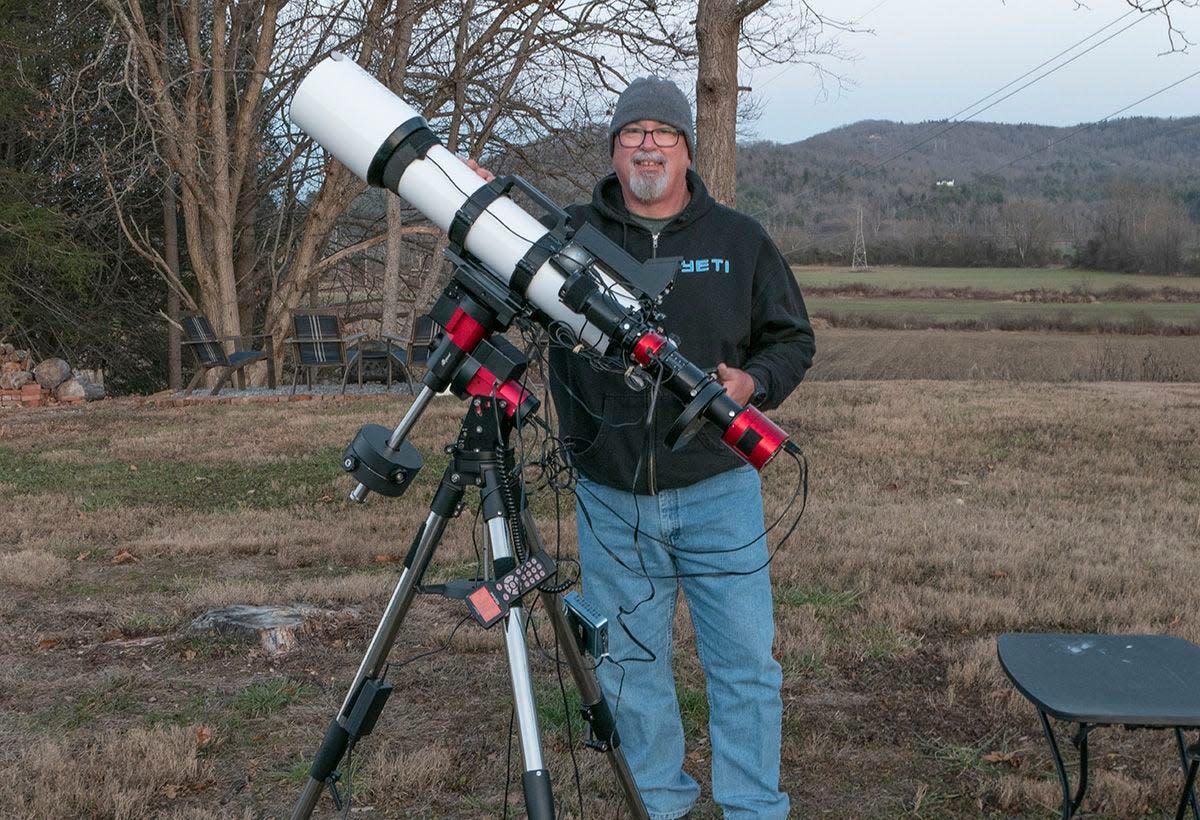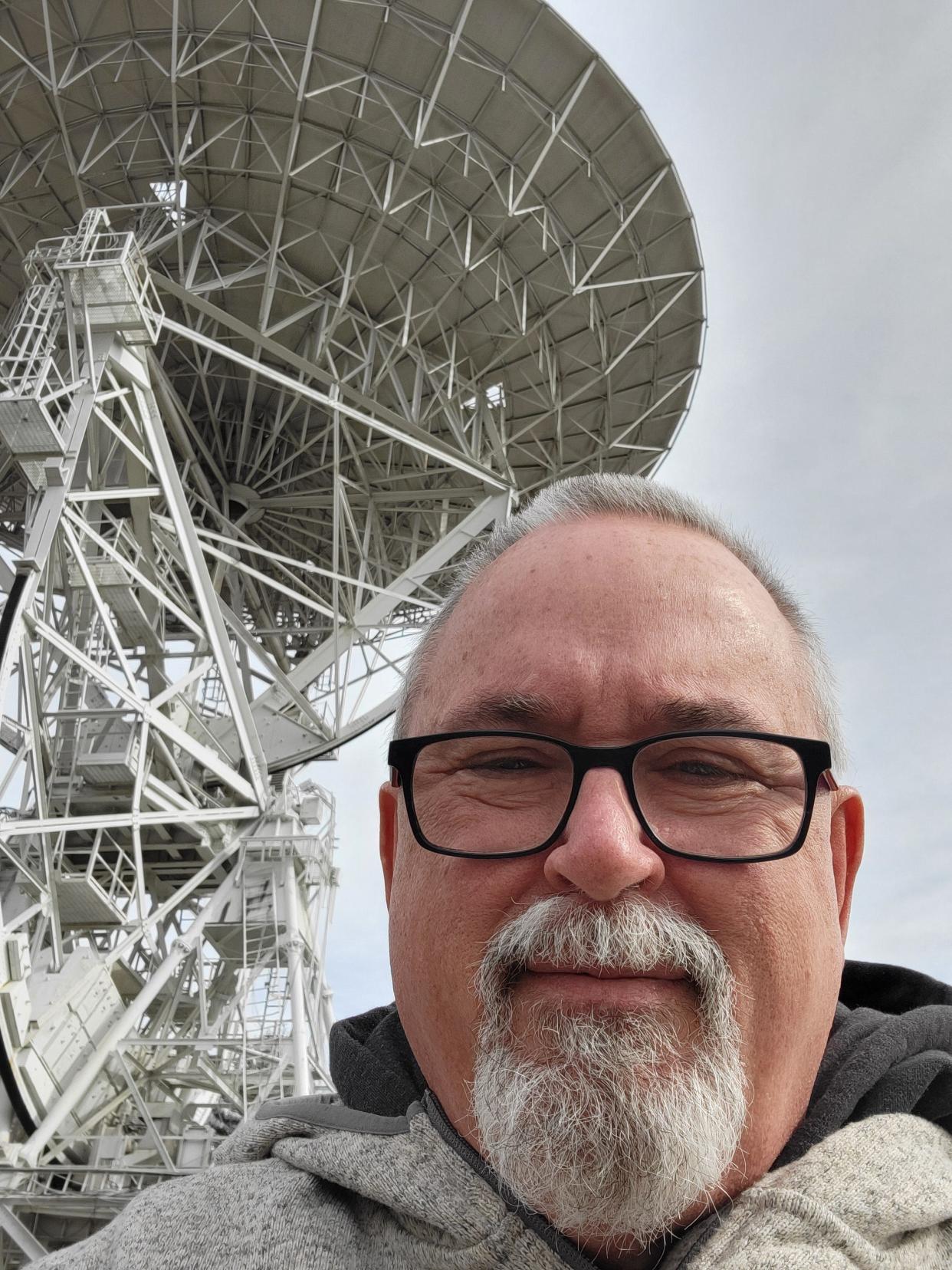Brevard astronomer and PARI volunteer named a NASA Solar System Ambassador
BREVARD - The year 2024 will be forever remembered by Brevard astronomer David Johnston for the upcoming solar eclipse in April, and for the recent announcement that he was named a NASA Jet Propulsion Laboratory Solar System Ambassador, he said.
Johnston, 64, of Charlotte has been fascinated by astronomy since he was a little kid during the Apollo moon mission days in the late 1960s to the mid 1970s.

He has been a member of the Planetary Society for 28 years and a STEM educator for 15 years. He is the only one in Henderson, Polk and Transylvania counties and is one of three in Western North Carolina. The other two are Asheville's Zoe Balaconis, who has been a member since 2016, and Canton's Danielle Hammond, who has been a member since 2018.
"I was thrilled to be named a Solar System Ambassador," said Johnston, a volunteer at Pisgah Astronomical Research Institute in Rosman. "I’ve been a NASA fan since the Apollo days and have followed many of NASA’s space missions closely over the years."
As a volunteer at PARI, Johnston conducts talks based on NASA missions, including on Mars rovers, exoplanet discovery and Hubble/James Webb Space Telescope discoveries.
"With the additional resources that are available to ambassadors and with the official NASA/JPL imprimatur, I will be able to more completely share the incredible story of NASA’s exploration of our solar system, including our own earth," he said.

An astronomy lover since he was a kid
Johnston said he's loved astronomy since he was a little kid, growing up during NASA's Apollo moon missions.
"My parents got me my first telescope when I was 10 – an Edmund Scientific 3-inch reflector with a wooden tripod, which my family’s dog promptly chewed through," he said. "I can remember sitting on the steps in front of our apartment, cradling the scope in my arms, trying to catch glimpses of the moon, Saturn and Jupiter."
More: Pisgah National Forest entrance in Brevard to get major update with traffic circle
More: Brevard couple seeking retribution after Carnival cruise passengers return to flooded cars
Johnston became a science educator and communicator when his daughter began demonstrating a propensity for science and engineering but had few opportunities to learn engineering at her school.
"A couple of friends and I got together and started a non-profit that brought after-school and summer engineering learning opportunities to kids in the Charlotte region," he said. "Pretty soon, I found myself teaching programming and engineering to kids."
The April 8 solar eclipse
Johnston said for people in Western North Carolina, the April 8 solar eclipse will not be a total eclipse, but it will be close.
"For Western North Carolina, the eclipse will start at about 1:50 p.m. and run until about 4:23 p.m. The largest coverage will be about 84% and will occur at about 3:08 p.m.," he said. "The path of totality for the upcoming eclipse runs through Texas, central U.S. and western New York and New England."
Johnston said he and his wife will be heading to Texas to be in the path of totality and they're currently making plans for the next one in 2028, which will be happening over Australia.
"We are hoping to head to Australia for the 2028 eclipse and do some astrophotography there," he said.
This trip will mark off his one bucket-list item, he said, which is to see the stars south of the equator.
Johnston said eye safety is paramount when viewing any type of eclipse.
"Folks should only look directly at the sun through proper filters. Sunglasses will not do the job," he said. "Even with the 84% coverage we will get in WNC, the sun is still bright enough to damage your eyes."
More tips from the American Astronomical Society are available at https://eclipse.aas.org/eye-safety. PARI will also be hosting an eclipse viewing. Tickets, which range from $40-$80, for the viewing are available at https://www.pari.edu/shop/tickets/event-tickets/eclipse-at-pari/.
Sharing his love of astronomy with others
Just like he did in his days living in Charlotte, Johnston is sharing his love of astronomy with a club (AstroBrevard) he helped form, he said.
"Part of what I do at PARI is act as an interface between PARI and AstroBrevard, arranging volunteers from the club to help with PARI’s star parties, work on donated telescopes and generally do what the folks at PARI need help with," he said. "In return, PARI allows us to hold meetings on campus and to use its observatory for club events."
Johnston said future talks will include presentations on Saturn’s moon, Titan, and NASA’s Dragonfly mission to it. Hia club holds monthly meetings, most of which are open to everyone, he said. He said he's able to do what he does, thanks to the staff at PARI.
"Virtually all my outreach stuff is teamwork with the PARI staff, PARI volunteers and my good friends at AstroBrevard. And, I have a very patient wife," he said.
Dean Hensley is the news editor for the Hendersonville Times-News. Email him with tips, questions and comments at DHensley@gannett.com. Please help support this kind of local journalism with a subscription to the Hendersonville Times-News.
This article originally appeared on Hendersonville Times-News: Meet the latest NASA Solar System Ambassador: Brevard's David Johnston
